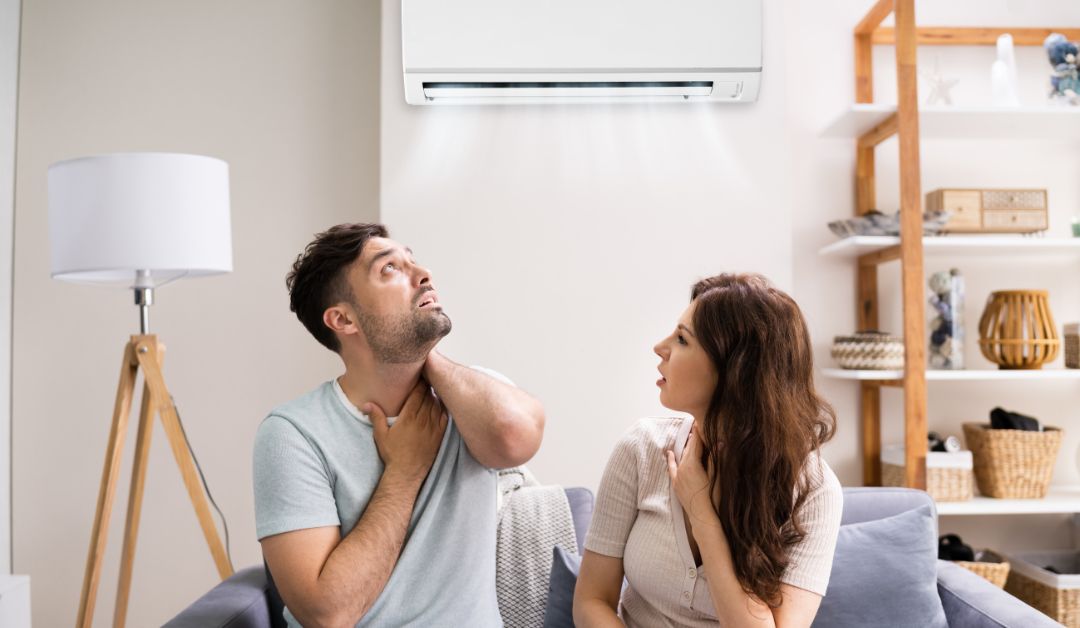Have you noticed your air conditioner making noises it never used to? A strange rattle, hum, or vibration can often be the first clue that something isn’t quite right.
Many homeowners assume that letting these issues slide will save them money, but it usually does the opposite. Minor faults left unchecked often develop into major breakdowns that come with a hefty price tag.
That’s why routine servicing is such a valuable investment.
Even with regular upkeep, wear and tear can creep in, and knowing what to look out for makes a big difference. With vast experience working with air con systems across Brisbane and beyond, we know the early red flags that signal your air conditioner may be in trouble.
The reality? The first sign of trouble could already be happening in your home, and catching it early is more important than most people realise.
Short Cycling
When an air conditioner switches on and off in quick bursts, it’s usually a warning sign that something is wrong. This behaviour, known as short cycling, often points to problems with the thermostat or a system that isn’t correctly sized for the space it’s cooling.
If the thermostat isn’t properly set up, it won’t send accurate signals to the unit. On the other hand, if the system is too powerful for the room, it will chill the air too quickly, leaving you with uneven temperatures and constant fluctuations.
The consequences of short cycling go far beyond comfort. Units that operate like this can chew through up to a quarter more energy than they should, sending power bills soaring. The repeated stopping and starting also puts heavy stress on motors and other components, which can shorten the life of the system considerably.
If you catch your air conditioner cycling on and off more than it should, it’s best to have a licensed technician investigate. Tackling the issue early can protect your system, cut energy costs, and save you from expensive repairs later.
System Sounds
Every air conditioner has a way of letting you know when something isn’t right. One of the first warning signs often comes in the form of unusual sounds. Each noise has its own story to tell about what might be happening inside the system.
For example, loud metallic clunks may signal that a part has shaken loose or is on the verge of breaking, while a faint hissing could mean refrigerant is leaking or airflow is escaping through damaged ductwork.
Electrical problems often reveal themselves through low buzzing or persistent humming, both of which shouldn’t be ignored.
Clicking is one of the more confusing noises. A single click when the system powers on or off is normal, but repeated clicking suggests problems with the controls, thermostat, or electrical relays.
Meanwhile, high-pitched squeals may indicate worn belts or stressed fan motors, both of which need quick attention before they fail.
Even seemingly harmless sounds like rattles or whistles can be a sign of trouble. Loose panels, screws, or trapped debris can cause rattling, while whistling airflow often indicates a clogged filter or blocked vent.
In ducted systems, popping noises are common as the metal expands and contracts with temperature changes. Ongoing popping may hint at old or poorly installed ductwork, though.
Another sound to watch for is dripping or gurgling, which often means excess condensation isn’t draining properly. This could be due to a clogged drain line or a water pan that’s close to overflowing.
No matter which sound you hear, the golden rule is the same: don’t ignore it. Strange noises are the system’s way of alerting you before small issues escalate into expensive breakdowns.
Calling a licensed air conditioning technician ensures the noise is correctly diagnosed and fixed before it affects comfort, efficiency, or safety.
Quick Guide: Noises and What They Might Mean
- Clunking/Banging – Loose or broken internal parts, such as fan blades or compressor components.
- Hissing – Refrigerant leaks or cracks in ductwork.
- Buzzing – Electrical faults, failing capacitor, or dirty outdoor coils.
- Clicking – Faulty thermostat or electrical relay problems if constant.
- Squealing – Worn belts or motor bearing issues.
- Rattling – Loose screws, panels, or debris in the outdoor unit.
- Humming – Motor or capacitor struggling to start.
- Whistling – Blocked filters, vents, or duct leaks.
- Popping – Expanding or contracting ductwork.
- Dripping/Gurgling – Blocked drainage or excess moisture buildup.
Strange Odours
Strange smells coming from your air conditioner are more than just unpleasant. They’re often the system’s way of warning you that something isn’t right.
Different odours usually point to different problems. Recognising them early can save you from bigger headaches down the track.
A damp, earthy scent usually suggests that mould or mildew has started to form inside the unit or ducting. A sharp burning smell can mean electrical components are overheating or wires are failing.
If the air carries a harsh chemical-like scent, this may indicate a refrigerant leak, which requires immediate professional attention. A stale, dusty odour is often the result of clogged filters or dirty ductwork restricting airflow.
Understanding what each smell could mean helps you take the right next step.
- Musty – mould or mildew growth inside the system.
- Burning – wiring, insulation, or motor issues.
- Sharp chemical – possible refrigerant leak.
- Stale – blocked filters or dirty vents.
For serious smells such as burning or chemical odours, contact a licensed air conditioning technician straight away, as these can pose safety risks. Musty or dusty odours, on the other hand, may be resolved by cleaning or replacing filters and scheduling a professional clean.
The best way to avoid unwanted smells is to keep your system well-maintained. Regular servicing and cleaning reduce the chance of build-up, protect indoor air quality, and ensure your unit continues running safely.
Airflow efficiency
When an air conditioner struggles to push air through the home, it usually points to something being wrong within the system. Blocked filters, damaged ducts, or a fan that isn’t working properly can all interfere with smooth airflow. In more serious cases, a failing compressor may also be to blame.
For ducted units, poor airflow doesn’t just mean weaker performance. It can also throw off the zoning functions, making it harder to keep different areas of your home comfortable.
That’s why ongoing upkeep is so important. Without it, uneven room temperatures and higher running costs often become noticeable.
If you’re concerned your system might not be circulating air properly, keep an eye out for tell-tale signs such as:
- Vents covered in dust and debris, or blocked by furniture.
- Some rooms feeling much warmer or cooler than others.
- Filters clogged with dirt or left unchecked for too long.
- The unit taking longer than normal to reach the set temperature.
Catching these red flags early can save you money, improve comfort, and keep your air conditioner running as efficiently as possible.
Indoor water leaks
Noticing water collecting around your air conditioner is never a good sign. If liquid starts showing up indoors, it usually means the system’s drainage process isn’t working as it should.
In many cases, the culprit is either a blocked pipe designed to carry condensation away or a faulty pump that fails to push the water out. When these parts stop doing their job, moisture backs up and leaks where it doesn’t belong.
Leaving the problem unresolved can cause more than just a messy floor. Excess water can seep into building materials, leading to rot, swelling, or other expensive structural issues.
On top of that, damp areas inside a home create ideal conditions for mould growth. This can spread quickly and impact indoor air quality.
Industry research shows households that overlook water leaks from their cooling systems often spend significantly more on repairs over time compared to those who address the issue early. Acting quickly not only protects your property but also helps safeguard the health of everyone living in your home.
Inadequate performance
If your air conditioner starts pushing out hot air when it should be cooling, that’s a strong signal something isn’t right. Often, this happens because the cooling gas levels have dropped too low or the main unit responsible for circulating the refrigerant isn’t functioning correctly.
Coolant plays an essential role in absorbing and moving heat. Without enough of it, the system simply can’t produce cold air.
Similarly, if the core mechanical component responsible for pressurising the refrigerant breaks down, the entire cooling process is disrupted.
Before jumping to conclusions, it’s worth doing a few simple checks yourself. Make sure the thermostat hasn’t been set to the wrong mode and confirm the temperature is set correctly. If everything looks fine but the warm airflow continues, it’s time to get a qualified technician involved.
Handling refrigerants is a licensed trade in Australia, and compressor faults usually require a thorough inspection before repairs can begin. Calling in a professional ensures the problem is fixed safely and properly without risking further damage to your unit.
Unresponsive thermostat
When your air conditioner doesn’t respond to temperature changes or refuses to follow remote commands, the problem often comes down to faulty wiring, a damaged control unit, or malfunctioning sensors.
The thermostat acts like the brain of your cooling system, so if it isn’t working properly, the entire unit suffers. Here are a few checks you can make before calling for help.
Check the Mode and Temperature
Make sure the control is set to “cool” and that the chosen temperature is actually lower than the current room temperature. Incorrect settings are a surprisingly common reason why systems appear unresponsive.
Look at the Screen or Display
If the display is blank or not responding, try replacing the batteries. Remotes and wall units should have a small compartment at the back or underneath where new batteries can be fitted.
Review the Schedule
Pre-programmed schedules can sometimes clash with your comfort needs. Double-check the day and time settings to ensure they’re correct. For testing, switch to manual mode to see if the system starts working as expected.
If these steps don’t fix the issue, it usually points to a deeper fault within the thermostat or system wiring. At that stage, the safest option is to contact a licensed technician who can carry out proper testing and repairs.
Conclusion
Air conditioners are complex systems. Even small warning signs can indicate bigger problems developing behind the scenes.
From odd sounds and unusual smells to weak airflow and unexpected leaks, each of these issues points to something that requires attention. Ignoring them can lead to higher running costs, more extensive damage, and even health risks in your home.
Each of the 7 signs we’ve covered is your air conditioner’s way of telling you that something isn’t right. Some checks, like replacing filters or batteries, can be done at home. But most problems require the expertise of a licensed technician.
Have you noticed unusual noises, smells, or changes in your air conditioner’s performance? Don’t wait until it breaks down completely.
Contact us to book your maintenance today and keep your home comfortable all year round.
















